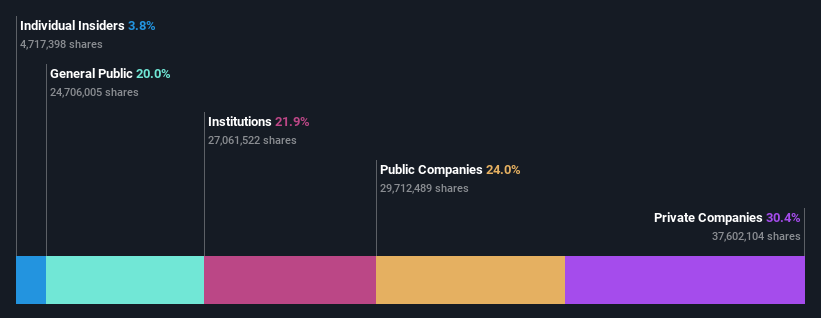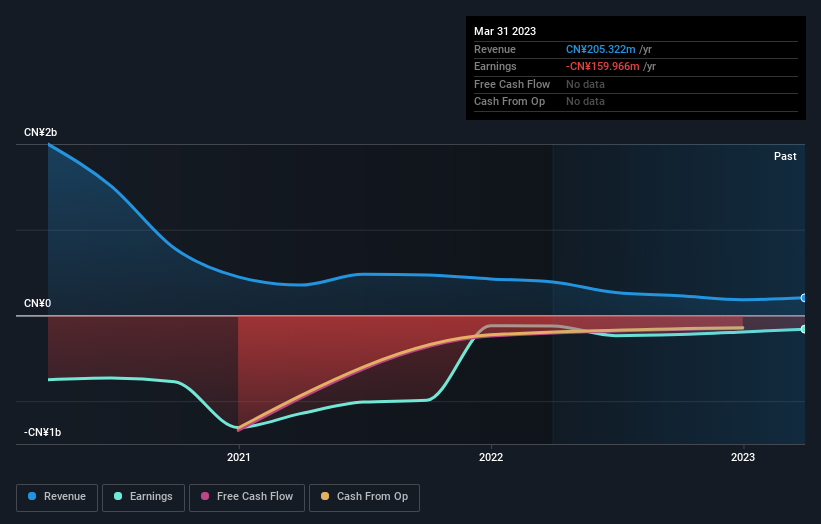Private companies account for 30% of Tuniu Corporation's (NASDAQ:TOUR) ownership, while public companies account for 24%
Key Insights
Tuniu's significant private companies ownership suggests that the key decisions are influenced by shareholders from the larger public
51% of the business is held by the top 4 shareholders
To get a sense of who is truly in control of Tuniu Corporation (NASDAQ:TOUR), it is important to understand the ownership structure of the business. And the group that holds the biggest piece of the pie are private companies with 30% ownership. That is, the group stands to benefit the most if the stock rises (or lose the most if there is a downturn).
Public companies, on the other hand, account for 24% of the company's stockholders.
Let's delve deeper into each type of owner of Tuniu, beginning with the chart below.
See our latest analysis for Tuniu
What Does The Institutional Ownership Tell Us About Tuniu?
Many institutions measure their performance against an index that approximates the local market. So they usually pay more attention to companies that are included in major indices.
Tuniu already has institutions on the share registry. Indeed, they own a respectable stake in the company. This implies the analysts working for those institutions have looked at the stock and they like it. But just like anyone else, they could be wrong. If multiple institutions change their view on a stock at the same time, you could see the share price drop fast. It's therefore worth looking at Tuniu's earnings history below. Of course, the future is what really matters.
Hedge funds don't have many shares in Tuniu. BHR Winwood Investment Management Ltd is currently the company's largest shareholder with 24% of shares outstanding. In comparison, the second and third largest shareholders hold about 18% and 4.8% of the stock. Furthermore, CEO Dunde Yu is the owner of 3.8% of the company's shares.
Our research also brought to light the fact that roughly 51% of the company is controlled by the top 4 shareholders suggesting that these owners wield significant influence on the business.
While it makes sense to study institutional ownership data for a company, it also makes sense to study analyst sentiments to know which way the wind is blowing. As far as we can tell there isn't analyst coverage of the company, so it is probably flying under the radar.
Insider Ownership Of Tuniu
The definition of an insider can differ slightly between different countries, but members of the board of directors always count. The company management answer to the board and the latter should represent the interests of shareholders. Notably, sometimes top-level managers are on the board themselves.
Most consider insider ownership a positive because it can indicate the board is well aligned with other shareholders. However, on some occasions too much power is concentrated within this group.
Shareholders would probably be interested to learn that insiders own shares in Tuniu Corporation. As individuals, the insiders collectively own US$7.3m worth of the US$191m company. This shows at least some alignment, but we usually like to see larger insider holdings. You can click here to see if those insiders have been buying or selling.
General Public Ownership
The general public, who are usually individual investors, hold a 20% stake in Tuniu. While this size of ownership may not be enough to sway a policy decision in their favour, they can still make a collective impact on company policies.
Private Company Ownership
We can see that Private Companies own 30%, of the shares on issue. Private companies may be related parties. Sometimes insiders have an interest in a public company through a holding in a private company, rather than in their own capacity as an individual. While it's hard to draw any broad stroke conclusions, it is worth noting as an area for further research.
Public Company Ownership
It appears to us that public companies own 24% of Tuniu. It's hard to say for sure but this suggests they have entwined business interests. This might be a strategic stake, so it's worth watching this space for changes in ownership.
Next Steps:
While it is well worth considering the different groups that own a company, there are other factors that are even more important. Be aware that Tuniu is showing 1 warning sign in our investment analysis , you should know about...
Of course this may not be the best stock to buy. Therefore, you may wish to see our free collection of interesting prospects boasting favorable financials.
NB: Figures in this article are calculated using data from the last twelve months, which refer to the 12-month period ending on the last date of the month the financial statement is dated. This may not be consistent with full year annual report figures.
Have feedback on this article? Concerned about the content? Get in touch with us directly. Alternatively, email editorial-team (at) simplywallst.com.
This article by Simply Wall St is general in nature. We provide commentary based on historical data and analyst forecasts only using an unbiased methodology and our articles are not intended to be financial advice. It does not constitute a recommendation to buy or sell any stock, and does not take account of your objectives, or your financial situation. We aim to bring you long-term focused analysis driven by fundamental data. Note that our analysis may not factor in the latest price-sensitive company announcements or qualitative material. Simply Wall St has no position in any stocks mentioned.


